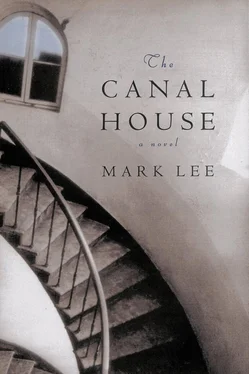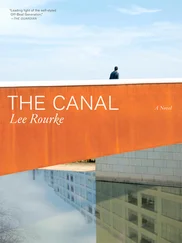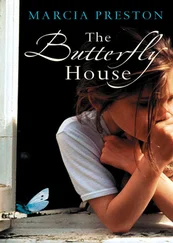A spiral staircase with a curving banister led downstairs to a bathroom with a claw-foot tub, an artist’s studio littered with canvases and half-finished paintings, and a bedroom with old-fashioned wooden blinds. Down there, closer to the water, you could see the brightly painted narrow boats that were moored on one side of the canal. I discovered that people lived on the boats, all year round, using propane burners to cook and little coal stoves to keep themselves warm. In the morning, light was reflected off the water onto the bedroom ceiling. I used to wake up early and lie in bed watching the water light while Daniel moved restlessly in his sleep. Cut into strips by the blinds, the light shimmered and sparkled on the white plaster until a narrow boat approached the house and a dark shadow swept across the room.
BY UNSPOKEN CONSENT, we declared our own private republic and seceded from the rule of time. A digital clock was in the bedroom, but Daniel unplugged it because he disliked the glowing green numbers. “It’s too insistent,” he said, and that became a code word between us. We decided not to be insistent or nervous about anything. Daniel threw out his last two packs of cigarettes. We went to bed when we felt sleepy, opened our eyes when sunlight entered the bedroom. I’d go upstairs and brew a pot of tea while Daniel made muddy-looking coffee with a French press. We ate simply: I’d make toast or pour a bowl of cereal. Daniel ripped off stale chunks of bread from yesterday’s baguette and dipped them in his coffee while he sat at the kitchen table and gazed out the window at the canal.
A pair of swans and a half-dozen sea gulls were usually floating on the dark water. Coal fires burned in the narrow boats, and the sharp smell of the smoke reminded me of the bonfires at Kosana. Plump men in warm-up suits jogged slowly down the canal path, passing old women walking their dogs. While I poured my second cup of tea, the people who lived on the narrow boats left for their jobs or emerged on deck to water their potted plants. As the weeks went by, Daniel made up elaborate stories about these boat dwellers. A bank robber hiding from the police lived in one boat next to a young woman novelist in a green boat who lived next to a bearded man in a yellow boat who had murdered his wife and was removing her body in little parcels.
We went out in the morning, walking a few blocks west to the open-air market on Church Street. Music floated out half-open windows and blared from boom boxes: Sufi chanting, hip-hop, and jazz. Girls with lime green hair searched for cheap shoes and costume jewelry while Muslim women, concealed in black chadors, pushed their wire shopping carts past Jamaican women selling flowers. We bought food and clothes and music CDs from the street peddlers, but we never bought a newspaper. Before he’d gone to Africa with Nicky, Daniel said he’d read three or four papers a day. When I brought home a copy of the Guardian , he refused to look at the front page. “It’s too insistent,” he said, and I gave the paper to the Ceylonese man who sold fish.
We’d return to the Canal House after shopping, lock the door and search through the piles of books. I read Middlemarch and The Woman in White . Daniel was more eclectic. He read Philip Larkin’s poetry for the first time, Joyce’s Dubliners , and an elaborate book, with blueprints, about how to build your own sailboat.
No television. No radio. Instead we went downstairs and made love in a slow, deliberate way. Daniel recorded tapes of his favorite music and played them when we were in bed together. Sometimes I felt like the music was a liquid and I floating within it. I listened to a John Coltrane solo from a club recording of “Blue Train” and Cannonball Adderley’s sad, reflective version of “Autumn Leaves.” The clock with the numbers was hidden in the closet and everything we did had a certain languorous quality. I remember Daniel lying naked on the bed while I kissed every spot of his skin. I remember him touching my breasts with the palm of his hand, so lightly that I could barely feel it. One afternoon as it rained I lay on the bed, warm beneath the faded blue coverlet, staring out the window. Daniel held me in the crook of his arm and ran his hand from my shoulder to my knee and back again.
We talked about the past, but not in the usual way. Richard had always been curious about my previous lovers. How did you meet him? Did you love him more than me? But Daniel never asked these questions and I didn’t want to know about his old girlfriends. At the Canal House, there was no one before and no one after.
We had both worked in so many of the same countries that I didn’t have to explain everything to him. I could say “I ran a clinic in Sarajevo” and not have to describe the daily sniper fire and the half-starved orphan children rocking back and forth on their mattresses. Daniel would say, “We crossed the border into Liberia, but we couldn’t find the rebels” or “It was difficult to travel through Angola that year.” And I would close my eyes and see him in a car on a dirt road with hidden land mines, his driver fearful, begging to turn around.
“Sometimes you’re lost and scared,” Daniel said. “But you can’t act that way. You can’t show weakness.”
“And what do you do when you’re lost?”
Daniel drew invisible patterns on my back with his finger. “Always ask for directions from a clever eight-year-old. As people get older, they learn how to lie.”
We never talked about the desire for excitement and the sense of mission that had pushed us both into these dangerous situations. For the first time in many years I had truly stepped away from it all and, when I was alone, I tried to assess my life. I had become a doctor to help people and that was still true. Though I didn’t want to be famous or wealthy, I was tempted by something even more seductive—that feeling that I was the crucial person, the one who was needed. Perhaps Daniel felt the same emotion. I once asked him why he avoided other journalists and traveled with just a photographer. “Because then it’s my responsibility,” he said. “I’m the only one who can tell the story.”
Sometimes, over a bottle of wine, we’d talk about the plane crash that killed Paul, Tobias, and Joan. Daniel didn’t feel guilty about what had happened, but he couldn’t believe, as he had in the past, that life was a series of random incidents without implications for the future. He talked about living a life that would justify the fact that he had survived. For years, he’d wandered from one country to another, getting interviews and writing articles, then returning to Bracciano. But the plane crash made him feel that his own existence was a privilege with unknown obligations.
I FOUND SOME COOKBOOKS under the bed and we began to take turns making dinner. One of us would go off alone and come back with surprises in a shopping bag. We offered each other strange foods, expensive foods, pastry and sweets and fruits that we had never tried before. One night, we ate eight kinds of cheeses—a pale yellow Pont-l’Évêque, a wedge of soft Boursin triple crème sprinkled with powdered sugar. Daniel bought fresh mangoes and dipped them in chocolate. I baked a coconut cake and covered it with butter icing. As a medical student I had lived on plastic pouches of food, warmed in microwave ovens. I knew almost nothing about cooking and was constantly burning things or watching cakes go flat for mysterious reasons. But there were occasional triumphs. I made a crème caramel that was perfect, the rich custard surrounded by brown sugary syrup. Daniel ate a spoonful and smiled. “It’s delicious,” he said softly. And I leaned across the table and kissed him, tasting the sweetness on his lips and tongue.
Читать дальше












